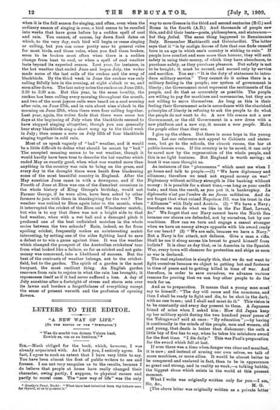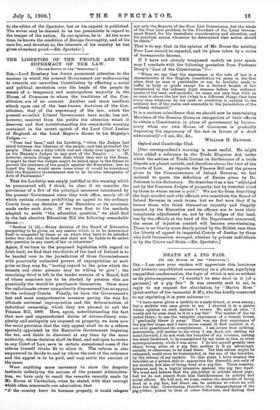LETTERS TO THE EDITOR.
"A NEW WAY OF LIFE."
LTo Tun EDITOR 01 Till 5PECTATOR:1
"Was du ererbt von deinen Vatern bast, Erwirb es, um es zu besitzen."*
Slk,—Much obliged for the book, which, however, I was already acquainted with. As I told you, I entirely agree. In fact, I agree to such an extent that I have very little to say. You have been almost the first of public writers to see and foresee.. I am not very sanguine as to the results, because I do believe that people at home have really changed their character, owing partly, I suppose, to physical causes and partly to moral ones. The "new way of life" was the only
• Goethe's Faust, Naeht "What thou hest inherited from thy fathers earn for thyself, so as to lioness it..'
way to save Greece in the third and second centuries (B.C.) and Rome in the fourth (A.D.) And thousands of people saw this, and did their bests—poets, philosophers, and statesmen— but they failed. The same thing happened to Renaissance Italy. Remember Machiavelli and Guicciardini. The latter says that it "is by malign decree of fate that one finds oneself born in an age in which one's country is sinking to ruin." If people love comfort and ease more than honour, they will seek safety in using their money, of which they have abundance, to purchase safety, as they purchase pleasure. But safety is not to be bought; it must be earned, and earned only by service and sacrifice. You say : "It is the duty of statesmen to intro-
duce military service." They cannot do it unless there is a military feeling in the people; our system of government is
liberty; the Government must represent the sentiments of the people, and do that as accurately as possible. The people are willing to pay for machines and mercenaries, but they are not willing to serve themselves. As long as this is their feeling their Government acts in accordance with the cherished principles of liberty in refusing to ask the people to do what the people do not want to do. A new life means not a new Government, or the old Government in a new dress with a new platform and a new cry, it means a new people. .Malta the people other than they are.
I give up the elders. But there is some hope in the young ones. Let our reformers not appeal to Cabinets and states- men, but go to the schools, the church rooms, the bar at public.houses even, if the country is to be saved, it can only be saved now by the regeneration of the whole people, and this is no light business. But England is worth saving; at least it was once thought so.
As instances of the " phenomena " which meet me when I go home and talk to people :—(1) "We have diplomacy and alliances; therefore we need not expend money, on war."
Diplomacy without military strength is like banking without money : it is possible for a short time,—as long as your credit lasts ; and then the result, as you put it, is bankruptcy. La diplomatic n'est que l'ombre de ses forces milituires. And do not forget that what ruined Napoleon III. was his trust in the " Alliances " with Italy and Austria. (2) "We have a Navy; therefore we can do what we like in the Far East, Levant, &c." We forget that our Navy cannot leave the North Sea because our shores are defended, not by ourselves, but by our machines. How can we turn and engage a casual stranger .
when we have an enemy always opposite with his sword ready for our heart ? (3) "We are safe, because we have a Navy."
But a Navy is for attack, not defence. Give a man a rifle. Shall he use it slung across his breast to guard himself from bullets? It is clear as day that, as in America in the Spanish War, every town will clamour for protection and ships as soon as war is declared.
The real explanation is simply this, that we do not want to fight ourselves because we object to getting hot and footsore" in time of peace and to getting killed in time of war. And therefore, in order to save ourselves, we advance various reasons for proving that we can buy other people to do the work for us.
And as to preparation. It means that a young man must, say to himself : "The day will come and the summons, and then I shall be ready to fight and die, to be shot in the dark, with no one to see; and I shall and must do it." This vision is to be constantly and every day present to them. A Japanese friend of mine when I asked him : How did Japan keep up her military spirit during the two hundred years' peateof • the Tokugawas ? said at once : "By education" ;—by having it continually in the minds of the people, men and women, old and young, that death is better than dishonour: the oath a little boy of five has to say, when he takes his miniature sword • for the first time. "I die daily." This was Paul's preparation for the sword which fell at last.
If ever there was a time when danger was clear and manifest,. it is now ; and instead of arming our own selves, we talk of more machines, or more allies. It would be almost better to be conquered and enslaved in fact, than to be in appearance so great and strong, and in reality so weak,—a talking bubble, the biggest sham which exists in the world at this present moment.
What I write was originally written only for you.—I am,' to the editor of the Spectator, but at his request is published. The writer may be deemed to be too pessimistic in regard to the temper of the nation. In our opinion, he is. At the same time, he knows the condition of Europe thoroughly, and of his care for, and devotion to, the interests of his country he has given abundant proof.—ED. Spectator.]















































 Previous page
Previous page